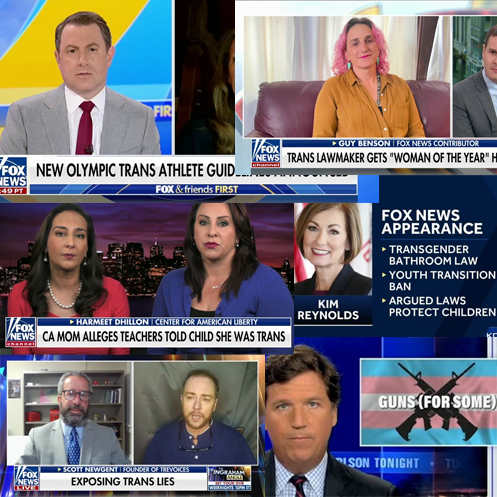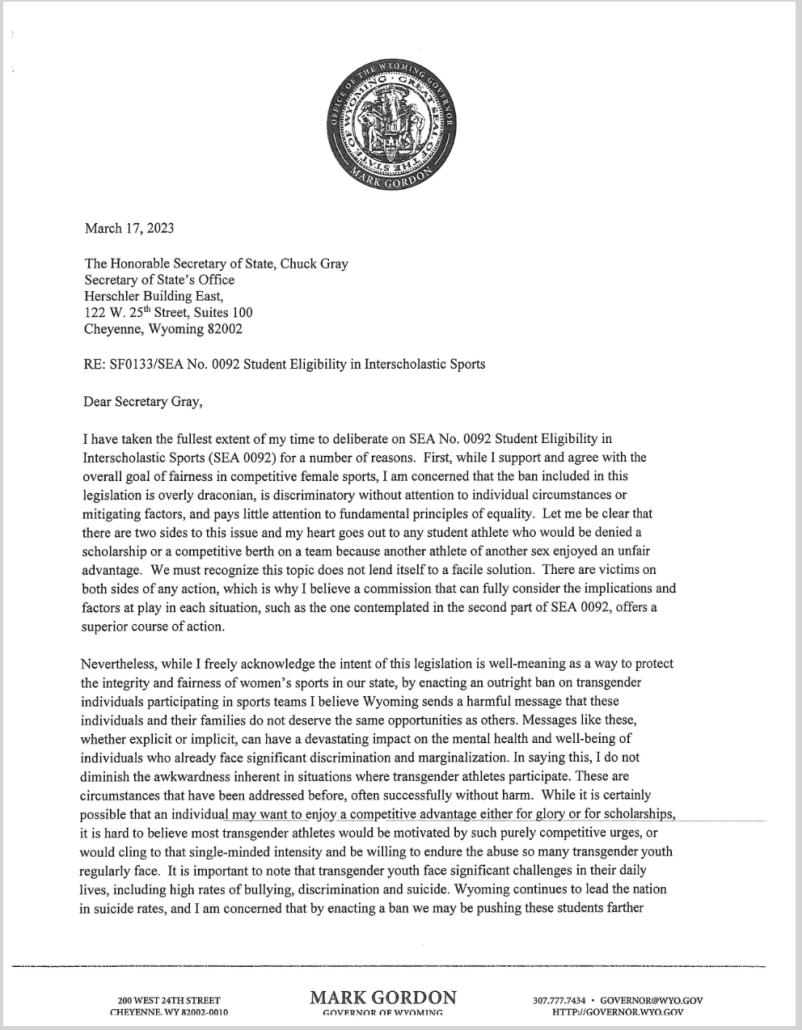As the Freedom Caucus strengthens its grip over the Wyoming Legislature, lawmakers spend more and more time debating headline-grabbing bills that either do nothing, help no one, or both.
This includes passing an abortion ban that won’t stop abortions, a “crossover voting” ban that won’t keep RINOs from voting in GOP primaries, and other bills that mercifully never reached the governor’s desk.
The Daddy of ’Em All in 2023, however, was Wyoming’s new law to thwart that most-hyped boogeyman of the moment: transgender student athletes.
Little issue, Big Government
Regardless of how you feel about transgender students participating in school sports, it’s hard to argue that the issue requires full-blown intervention by the state.
The Wyoming High School Activities Association has had a rule on the books since 2014 governing trans students’ participation. It has done nothing but gather dust.
“Some schools have said ‘no’ to [trans] students, and some have said ‘yes.’ We have not had an appeal on either side.”
That’s because local school districts have always been able to successfully deal with situations themselves on a case-by-case basis.
During the 2023 legislative session, a member of the House Education Committee asked WHSAA Director Ron Laird whether he felt the current system governing trans athletes was working.
Laird’s response surprised legislators on both sides of the issue: Transgender students have requested to participate in sports at schools across Wyoming, and in each case the local community found a solution without asking Big Government to step in.
The state association has never had to apply its rule, even though it has one.
“We’ve had some schools who have said ‘no’ to [trans] students, and we’ve had some schools who’ve said ‘yes’ to trans students, and at this point we have not had an appeal on either side,” Laird said.
Issuing a statewide ban on transgender athletes—when no one has appealed a single school district’s ruling—is perhaps the definition of a solution looking for a problem.
Trans obsession
With precisely zero people having brought the issue before state authorities over the past nine years, and with a whopping total of four trans athletes currently involved in Wyoming sports, it seems like banning them might be last on the list of priorities for lawmakers to tackle.

After all, there are things like rising property taxes, Wyoming’s mental health crisis, the state’s teacher shortage, and other real problems to confront.
But, thanks to the Freedom Caucus’ growing influence, the Wyoming Legislature has become far less interested in actual problems facing state residents than it is with national hot-button topics that gin up hysteria and mobilize right-wing voters.
One research group found that FOX News aired 170 segments about the dangers of trans people in a three-week period in 2022. That’s roughly 43 news segments for each trans student athlete in Wyoming.
No wonder, then, that Freedom Caucus lawmakers obsessed with national media would choose to fixate on the issue.
RINO rationale
To be clear, the Freedom Caucus does not yet have the numbers in the Wyoming Legislature to pass bills all on its own.
Nevertheless, “Senate Fill 133 – Student eligibility in interscholastic sports,” cleared both the House and the Senate by wide margins.
Many traditional, moderate Republicans voted “aye” on the bill while expressing regret and acknowledging the likely harm of banning children from sports because they are transgender.
For these lawmakers, it came down to simple political calculation.

There are a handful of hot-button national issues that the Freedom Caucus prioritizes. Demonizing transgender people is near the top.
If Republican legislators don’t vote in line with these priorities, they will face vicious attacks and slander from the Freedom Caucus and its close ally, the Wyoming State Republican Party.
This could hurt their re-election bids.
Most members of the “Team Wyoming” caucus—the moderate bloc of lawmakers that acts as a counterpoint to the Freedom Caucus—were courageous enough in 2023 protect public schools, fund critical government programs, support healthcare access for low-income moms, and advance other policies that benefit Wyomingites.
For each of these acts, they will be labeled “RINOs” by radical right.
Few, however, felt it would be worth the headache to publicly take a hard stance in support transgender students who want to play sports.
This included Governor Mark Gordon, who in a three-page letter outlined his many problems with SF-133, even calling it “draconian,” while explaining why he refused to sign it.
But at the end of the day, Gordon let the bill proceed without his signature. He knew that if he vetoed a transgender athlete ban this year, he would not only be called a “groomer” and a “pedophile”—but there would also likely be something even worse coming down the pipeline in 2024.
Surprise: We’re getting sued!
Among Gordon’s reasons for not signing SF-133 was that he believed it was “an invitation to a lawsuit.”
“We’re not saying: ‘No matter what kind of advantage a trans student may have, they must be able to play no matter what.”
Legislators, acknowledging that the bill was potentially unconstitutional, earmarked $100,000 so the state attorney general’s office could defend it against litigation.
Federal Title IX rules governing school sports prohibit discrimination on the basis of gender. Ongoing court cases are working to determine whether that includes discriminating against transgender kids.
Wyoming will add to the legal fray this summer, when LGBTQ advocacy group Wyoming Equality files suit upon SF-133 becoming enacted on July 1.
Sara Burlingame, the group’s executive director, acknowledged in a statement that there are instances when it might not be appropriate for a transgender student to compete in a sport.
But an outright ban isn’t the answer.
“We’re not saying: ‘No matter what kind of physical advantage a trans student may have, they must be able to play no matter what,” Burlingame said. “The answer is not ‘always.’ But the answer also shouldn’t be ‘never.’”
Back to the status quo?
Along with funding for a lawsuit, legislators also included a “Plan B” in SF-133 in the event that courts find the ban unconstitutional.
In that case, according to the new law, the Wyoming High School Athletics Association would assemble a commission to review eligibility for trans student athletes on a case-by-case basis.
The commission would include an athletic director or coach, a mental health professional, a parent of a current student, and two members at large.
In short, the situation wouldn’t be a whole lot different than what we’ve had for the past decade.
If this is the case, all the hype about banning trans athletes, all the time and hoopla at the Legislature, will have been nothing but hot air.
Meanwhile, many of Wyoming’s other very real problems will remain unsolved.

